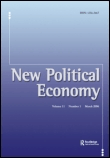
NEW POLITICAL ECONOMY
Scope & Guideline
Bridging Disciplines for a Deeper Understanding
Introduction
Aims and Scopes
- Political Economy Analysis:
The journal emphasizes a critical analysis of political economy, scrutinizing the relationship between political power and economic systems, and how these interactions influence policy and societal outcomes. - Interdisciplinary Approach:
It adopts an interdisciplinary approach, integrating insights from economics, political science, sociology, and environmental studies to provide a holistic understanding of complex socio-economic phenomena. - Focus on Global Capitalism:
The journal explores the dynamics of global capitalism, including financialization, neoliberalism, and the impact of economic policies on different regions and communities. - Socio-Economic Inequality:
A core area of focus is the examination of socio-economic inequalities, including gendered dimensions of capitalism, labor exploitation, and the effects of economic policies on marginalized groups. - Environmental Political Economy:
The journal addresses the political economy of environmental issues, emphasizing the interconnectedness of economic practices and ecological sustainability. - Emerging Economic Theories:
It encourages the exploration of emerging economic theories, such as modern monetary theory, post-neoliberalism, and degrowth, providing a platform for innovative ideas and critiques.
Trending and Emerging
- Digital Transformation and Fintech:
There is a growing focus on the political economy of digital transformation and fintech, examining how these innovations impact economic practices, governance, and social relations. - Climate Change and Environmental Justice:
Emerging themes related to climate change and environmental justice are increasingly prevalent, highlighting the political economy of sustainability and the socio-economic implications of ecological crises. - Social Reproduction and Care Economy:
The investigation of social reproduction and the care economy is gaining traction, emphasizing the economic value of caregiving roles and their intersection with gender and labor dynamics. - Global Supply Chains and Labor Exploitation:
Recent papers focus on the complexities of global supply chains and the dynamics of labor exploitation within them, reflecting heightened awareness of ethical and sustainable practices in international trade. - Post-Neoliberal Economic Models:
The exploration of post-neoliberal economic models is trending, as scholars seek alternatives to traditional neoliberal frameworks in response to growing socio-economic inequalities and crises. - Geopolitical Economic Shifts:
The journal is increasingly addressing geopolitical economic shifts, particularly regarding the rise of emerging economies and their implications for global power dynamics and economic governance.
Declining or Waning
- Traditional Neoclassical Economics:
There is a noticeable decline in papers that adhere strictly to traditional neoclassical economic theories, as the journal increasingly favors critical and alternative approaches to understanding economic phenomena. - Overly Technical Financial Analyses:
Papers that focus solely on technical financial analyses without a broader socio-political context have become less common, indicating a shift towards more integrative and critical perspectives. - Historical Economic Narratives:
The emphasis on historical economic narratives, while still present, appears to be waning as contemporary issues and immediate policy implications take precedence in recent research. - Purely Quantitative Studies:
There is a reduction in purely quantitative studies that do not incorporate qualitative insights or theoretical frameworks, as the journal increasingly values mixed-method approaches. - Focus on Domestic Policies:
The focus on domestic policies without consideration for their international implications is declining, reflecting a broader trend towards understanding the global interconnectedness of political economy.
Similar Journals
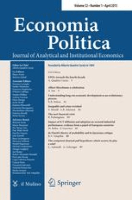
Economia Politica
Advancing Knowledge in Socio-Economic DynamicsEconomia Politica, published by SPRINGER INT PUBL AG, is a prestigious academic journal based in Switzerland, focusing on the intersection of economics, finance, sociology, and political science. With an impressive 2023 impact factor reflected in its Q2 and Q1 quartile rankings, the journal ranks #295 out of 1466 in Sociology and Political Science and #228 out of 716 in Economics and Econometrics category, highlighting its significance in the field. Spanning over a collaborative history from 2008 to 2024, the journal aims to foster scholarly dialogue and disseminate impactful research that contributes to the understanding of economic and political phenomena. Researchers and professionals interested in comprehensive analyses and innovative studies are encouraged to engage with its rigorous content, which remains a critical resource for advancing knowledge in socio-economic policies and frameworks.

World Review of Political Economy
Illuminating the Path of Political Economy ResearchWorld Review of Political Economy, a distinguished publication by PLUTO JOURNALS, emerges as a vital resource in the interdisciplinary landscape of political economy, sociology, and international relations. Initiated as an open access journal in 2021, it caters to scholars and practitioners by facilitating the immediate and unrestricted dissemination of research findings. With a significant presence in multiple quarters—ranking Q2 in the fields of Economics, Econometrics and Finance, Political Science, and Sociology—the journal reflects its commitment to addressing complex global issues through rigorous analysis and discourse. Nestled in the United Kingdom, it benefits from a rich academic environment, further amplified by its indexing in Scopus, which places it among the influential voices in social sciences. By encouraging innovative approaches and robust discussions, the journal aims not only to inform but also to inspire action among researchers, professionals, and students, thereby contributing meaningfully to the evolving field of political economy.
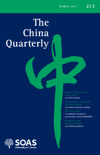
CHINA QUARTERLY
Illuminating China's Socio-Economic Landscape for Global UnderstandingCHINA QUARTERLY, an esteemed journal published by Cambridge University Press, serves as a leading platform for scholarly discourse in the fields of Development, Geography, Planning and Development, and Political Science and International Relations. With a strong reputation evidenced by its Q1 ranking in multiple categories and indexed since 1960, it attracts a diverse array of research focusing on the socio-economic and political dynamics within China and its impact on global affairs. The journal's rigorous peer-review process ensures the publication of high-quality articles that contribute meaningfully to contemporary debates and theoretical advancements. Although not open access, CHINA QUARTERLY offers extensive research opportunities for scholars, professionals, and students keen on exploring and understanding the intricate layers of China’s development and its global relations. Its dedicated address in Cambridge, United Kingdom underscores its commitment to fostering international dialogue and academic collaboration.
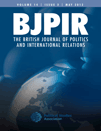
British Journal of Politics & International Relations
Engaging minds through impactful discussions on politics and policy.The British Journal of Politics & International Relations, published by SAGE Publications Inc, serves as a vital platform for scholarly discourse in the fields of political science and international relations. With an impressive impact factor and a Scopus rank of #64 out of 706 in Political Science, this journal is recognized for its rigorous, peer-reviewed articles that contribute significantly to academic knowledge and policy discussion. With a focused scope that spans both theoretical and empirical research, the journal holds a prestigious Q1 ranking in Political Science and International Relations, as well as a Q2 designation in Management, Monitoring, Policy, and Law. Established in 2005, it has emerged as an essential resource for researchers, professionals, and students alike, engaging with contemporary challenges and fostering critical analyses. Access options are available through institutional subscriptions, ensuring wide availability for those seeking to enrich their understanding of the complex interplay between politics and international dynamics.

Ekonomicheskaya politika
Shaping the future of economic discourse in Russia and beyond.Ekonomicheskaya politika, published by EKONOMICESKAA POLITIKA, is a premier journal dedicated to advancing the fields of economics, finance, and the sociopolitical dimensions impacting economic policies, particularly within the Russian context. Established in 2013, it plays a crucial role in addressing contemporary economic challenges and contributing to scholarly discourse. The journal is indexed in Scopus, demonstrating its relevance and scholarly impact, with its rankings and quartiles reflecting a strong commitment to quality research. Although it operates under a traditional access model, its comprehensive analyses and thought-provoking articles are essential resources for researchers, professionals, and students alike, fostering a deeper understanding of economic trends and policy implications in both global and local arenas. With its convergence of interdisciplinary approaches from economics, political science, and sociology, Ekonomicheskaya politika not only serves as a valuable academic platform but also as a critical reference point for policymakers and practitioners interested in the evolving landscape of economic policy.

REVUE D ECONOMIE POLITIQUE
Illuminating Contemporary Socio-Economic DynamicsREVUE D ECONOMIE POLITIQUE, published by EDITIONS DALLOZ, serves as a pivotal platform for scholars and professionals engaged in the intricate fields of political science and economics. Established in France, this esteemed journal addresses a wide array of topics pertaining to economic theories, political dynamics, and their interrelations, making it essential reading for those seeking to understand contemporary socio-economic issues. With an ISSN of 0373-2630 and an E-ISSN of 2105-2883, the journal is indexed in notable databases, achieving a category quartile ranking of Q3 in Political Science and International Relations and a respectable standing within other relevant fields. Although currently not open access, it remains a vital resource for researchers and students alike, enriching the academic discourse within its converged years from 1975, 1978, and 2005 to 2024. Positioned in a competitive landscape, with rankings of 442/706 in Political Science and 211/288 in Economics, the journal’s contributions continue to resonate within the scholarly community.
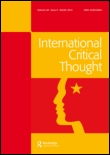
International Critical Thought
Fostering interdisciplinary dialogue for a complex world.International Critical Thought is a distinguished peer-reviewed journal published by Routledge Journals, Taylor & Francis Ltd in the United Kingdom. Since its inception in 2011, this journal has been at the forefront of advancing discourse across Cultural Studies, Political Science, International Relations, and Sociology. With an impressive range of interdisciplinary perspectives, it is categorized in the upper quartiles of Q2 for Cultural Studies and Q3 for Political Science and International Relations, reflecting its robust impact in these fields. Researchers and academics alike benefit from its rigorous analyses and thought-provoking articles, making it an essential resource for those engaged in critical scholarship. Although it is not an open-access journal, it offers valuable insights that cater to professionals, students, and anyone invested in the complexities of social and political thought. Join the conversation and explore the latest research shaping our understanding of contemporary critical theory.
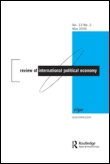
REVIEW OF INTERNATIONAL POLITICAL ECONOMY
Illuminating the complexities of political and economic systems.REVIEW OF INTERNATIONAL POLITICAL ECONOMY is a premier journal published by Routledge Journals, Taylor & Francis Ltd, recognized for its critical contributions to the fields of Political Science, International Relations, and Economics. Established in 1994, this journal has consistently been ranked in the top quartile (Q1) across its subject areas, reflecting its influence and prestige within the academic community. With an impressive Scopus ranking, it holds the 11th position among 706 journals in Political Science and International Relations, marking it in the 98th percentile, and ranks 42nd out of 1466 in Sociology and Political Science. As an indispensable resource for researchers, professionals, and students, it aims to advance scholarly discourse by publishing high-quality, innovative research that addresses the complexities of global political and economic systems. Situated in the United Kingdom, the journal serves as a vital platform for interdisciplinary dialogue, fostering a deeper understanding of international political economy dynamics.
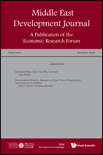
Middle East Development Journal
Innovating Perspectives on Regional Growth and PolicyMiddle East Development Journal is a premier academic publication dedicated to advancing scholarly discourse in the fields of Development, Economics, and Political Science, and is published by Routledge Journals, Taylor & Francis Ltd. With an ISSN of 1793-8120 and an E-ISSN of 1793-8171, this journal serves as a vital platform for researchers, professionals, and students eager to explore pivotal issues shaping the socio-economic landscapes of the Middle East. Operating within the Q3 category across multiple relevant disciplines, the journal is committed to fostering interdisciplinary perspectives and critical insights while maintaining a rigorous peer-review process. As it converges major themes from 2012 to 2024, the journal not only enhances the academic narrative but also informs policymaking and development strategies in a region marked by both challenges and opportunities. Researchers interested in contributing to or learning from the latest findings in these fields are encouraged to engage with the journal's diverse array of articles, which reflect the dynamic and evolving nature of Middle Eastern socio-economic studies.

NEW LEFT REVIEW
Exploring the Frontiers of Leftist ThoughtNEW LEFT REVIEW, published by NEW LEFT REV LTD, stands as a pivotal journal in the realms of Political Science and Sociology, contributing significantly to the intellectual debates shaping contemporary socio-political landscapes. With an ISSN of 0028-6060 and an E-ISSN of 2044-0480, this journal boasts notable Category Quartiles in 2023, ranking in the Q2 tier for both Political Science and International Relations and Sociology. With its prestigious status reflected in its Scopus Ranks—positioned at #214 out of 706 in Political Science and #511 out of 1466 in Sociology—the journal offers a robust platform for innovative and critical scholarship. Though not an open access publication, the journal presents an array of thought-provoking articles, ensuring that academic discussions remain vibrant and accessible to a broad audience from the UK and beyond. Scholars and students engaging with NEW LEFT REVIEW can expect an insightful exploration of leftist theories and movements, firmly placing the journal at the forefront of scholarly discourse.